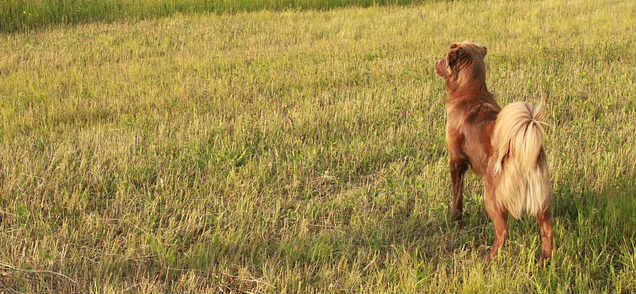How can I prevent impacted anal glands in dogs?
Original Question: I had our dog’s glands expressed by our vet as our dog was dragging her bottom on our carpet. When the vet drained the gland I asked if it was full their reply was no and that it was only a little. We took her back to our vet a month later and they put her on Prednisone and wanted to express the glands again. I told our vet that the last time they were drained there was very little and she still scooted. The vet said they needed to be expressed because of her allergies and again very little to express and to know avail. Does this to you sound like her anal glands are working fine or is this routine because of her allergies? - Robert
 Dec 10, 2018
Dec 10, 2018
Hi Robert,
Thanks for your question.
I can see how this is a very frustrating problem. Anal glands are located slightly below the anal opening, at the 4 o’clock and 8 o’clock positions. When a firm bowel movement comes out, it puts pressure on the anal glands and expresses them physically. Therefore, the most common reason for impacted anal glands in dogs is that soft stools are occurring. This is the first situation to address and maybe link to gastrointestinal parasites, food allergies, dietary sensitivities, stress, gastrointestinal infections, or anything else that can cause soft stools. Addressing a medical issue like this certainly has the ability to resolve the constant anal gland expression.
There are many cases I come across where there isn’t an underlying medical condition creating the problem. In those cases, it’s hard to know why the anal glands are having repeated problems. Some veterinarians believe that anal glands can be affected by stress, weight, allergies, and many other factors that we really don’t have evidence for as the cause. Given the frequency of your dog’s anal glands filling up, here are a few routes you can take to try and solve this problem. You can of course proceed with surgery and remove anal glands. Usually, surgical specialists perform this procedure but you’ll find the occasional veterinarian who does. The surgery will absolutely correct the problem. Personally, I try to avoid this option because it’s invasive and expensive.
What I would do in your situation is flush the anal glands. In my entire career as a veterinarian, I have only had one patient have their anal glands surgically removed. Every other patient that’s had this problem, and I’ve seen many, have been able to resolve it by flushing the anal glands. The procedure involves first sedating the patient. Then I use a very small catheter and insert it into each anal gland and flush them out with a copious amount of saline solution. Most importantly, I then pack the anal gland full of a medication, which most veterinarians will use for infections. There are a couple different products but each one of them has an antibiotic, an anti-inflammatory and an anti-fungal medication in it. This treatment tends to solve the problem for good because it resolves any infection that might be in the in the anal glands and reduces the inflammation. As always, please consult with your vet about the options I’ve outlined.
I hope this advice helps.
Dr. Clayton Greenway


Disclaimer: healthcareforpets.com and its team of veterinarians and clinicians do not endorse any products, services, or recommended advice. All advice presented by our veterinarians, clinicians, tools, resources, etc is not meant to replace a regular physical exam and consultation with your primary veterinarian or other clinicians. We always encourage you to seek medical advice from your regular veterinarian.

